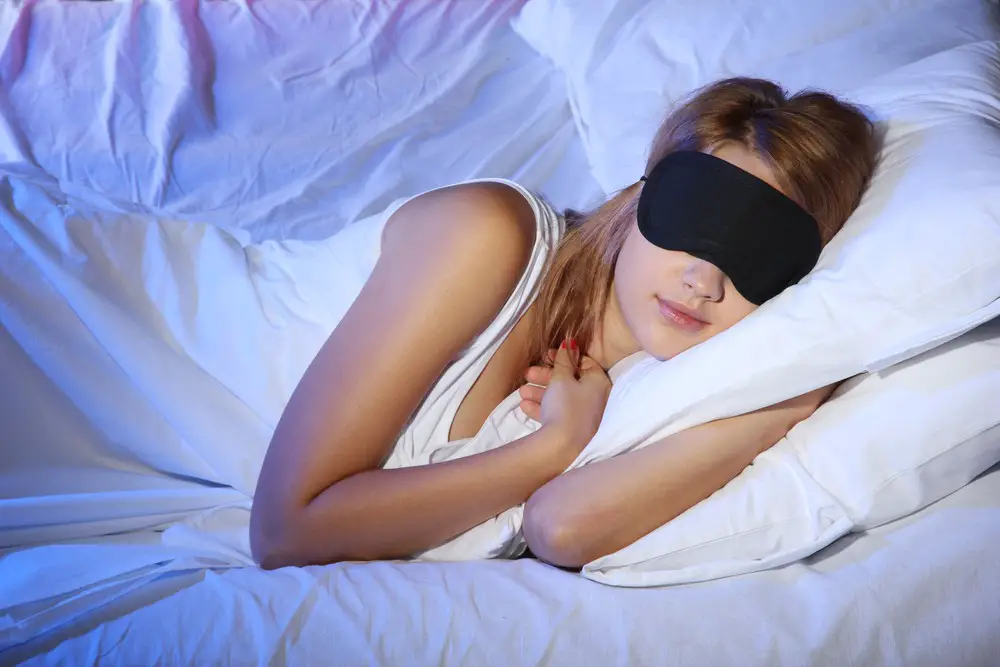As a BetterHelp affiliate, we receive compensation from BetterHelp if you purchase products or services through the links provided
As we slowly move past the era of COVID-19, the concept of masks has permanently embedded itself in our daily lives. While sleep masks have long been a bedtime staple for many seeking better rest, face masks have become an unavoidable accessory due to the pandemic. Now, as we adjust to new norms and routines, many people ask: Is sleeping with a face mask on beneficial or even safe? This guide aims to shed light on this topic, providing key takeaways on sleep masks, face masks, and how to make the best choices for your sleep needs.
Key Takeaways
- Sleep masks are designed to improve your sleep quality by blocking out light.
- When considering sleeping with a face mask, carefully weighing the pros and cons is crucial.
- Choosing the suitable mask for sleep or safety can significantly affect your overall rest and well-being.
The Importance of Sleep
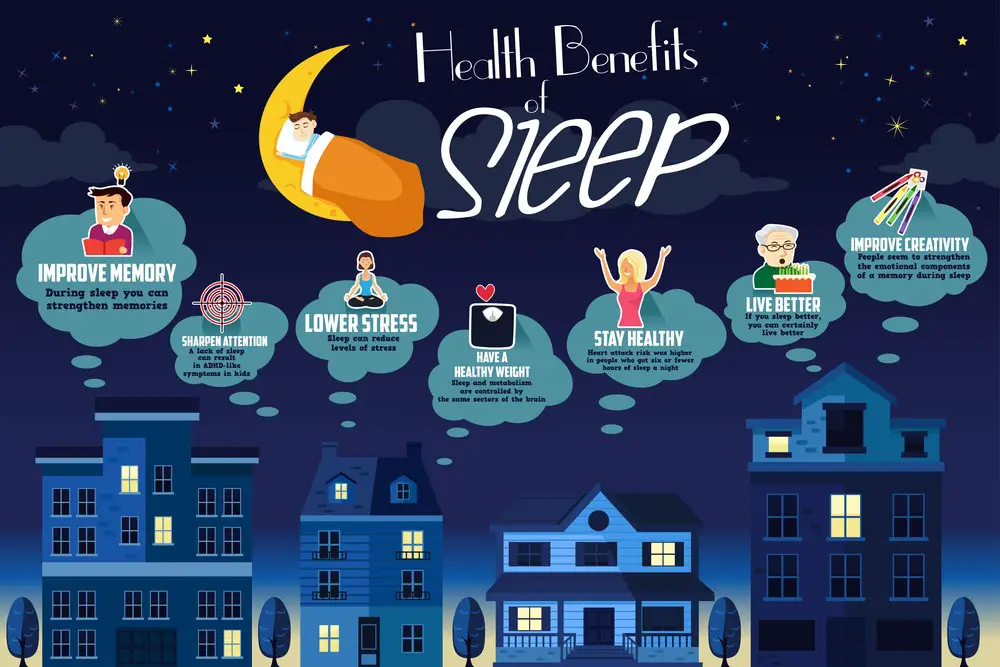
Sleep is crucial for maintaining both your physical and mental health. During this time, your body recuperates and restores energy, while your brain processes memories and emotions.
A good night’s sleep can make a difference in your overall mood and well-being. When you consistently get quality rest, you’ll notice a boost to your immune system, improved mental clarity, and a more balanced emotional state.
Your circadian rhythm plays a significant role in determining the quality of your sleep. This internal clock regulates the release of melatonin, a hormone that promotes a restful night. When you struggle with falling asleep, your body’s natural rhythm gets disrupted, making it even more challenging to get much-needed rest.
Here are a few tips to improve your sleep quality:
- Establish a regular sleep schedule to help your body find its natural rhythm.
- Create an optimal sleep environment: dark, quiet, and comfortable.
- Limit exposure to electronics before bedtime as the blue light can interfere with melatonin production.
- Incorporate relaxation techniques like meditation or deep breathing exercises to help quiet your mind and prepare for sleep.
By prioritizing and enhancing your sleep, you can positively impact your overall health and well-being. Remember, when you sleep better, you live better.
Understanding Masks

When sleeping with a mask, knowing more about the design, materials, and safety implications is essential. This will help you decide if sleeping with a mask suits you.
Masks come in various designs and materials, tailored to serve different purposes. The most common type of face masks are made of fabric, typically cotton or a blend. These masks are generally considered safe for long-term use. They’re reusable, washable, and breathable, making them great for daily wear. However, the efficiency of fabric masks varies depending on the number of layers and the quality of the fabric.
Another type of mask to consider is a disposable mask, like a surgical mask. These masks are made from a multi-layered material, usually featuring synthetic plastic fibers. While these masks offer decent protection, they’re not as breathable as fabric masks, and their frequent disposal may not be an eco-friendly choice.
Choose a mask design that sits comfortably on your face without irritating for optimal comfort. Look for soft, breathable materials like cotton or bamboo fabric. Make sure the mask conforms to the contours of your face to minimize gaps and enhance effectiveness.
Here are a few aspects to keep in mind when choosing a mask for sleeping:
- Fit: Ensure the mask fits snugly but comfortably on your face.
- Adjustability: Look for masks with adjustable ear loops or straps.
- Breathability: Opt for masks made from light, breathable materials.
- Protection: If you have health concerns, consider masks with filters for safety.
- Washability: Make sure the mask can be easily cleaned to maintain hygiene.
Sleeping with a mask can take some getting used to, so give yourself time to adapt. You might find that wearing a mask at night brings you peace of mind and helps you sleep better, especially during uncertain times. After all, it’s essential to prioritize your well-being and safety, both when you’re awake and when you’re asleep.
Sleep Masks and Their Benefits

You’ve probably heard of sleep masks, but have you ever wondered how they can improve your sleep quality? This section will explore the benefits of using sleep masks and why you might consider incorporating one into your nightly routine.
Sleep masks, also known as eye masks, are a great way to block out light and create a dark environment, perfect for sleeping. You may already have blackout curtains at home, but a sleep mask protects against unwanted light. This can be especially helpful if you’re traveling or have a partner who prefers to keep a light on.
One of the great things about sleep masks is that they come in various shapes, sizes, and materials, ensuring you’ll find the perfect fit for your needs. From traditional silk sleep masks to cooling options, there’s something for everyone. Silk sleep masks, for example, are soft and comfortable and can help prevent facial creases while sleeping.
Weighted eye masks go one step further in providing relaxation. Applying gentle pressure on the eyes can help soothe the nerves, slow down your thoughts, and improve your focus on relaxation. As a result, they can be a game-changer for those who struggle to unwind before bed.
Here are some benefits of using sleep masks:
- Block out light for a better sleep environment
- Improve relaxation and focus
- Help prevent facial creases with soft materials like silk
- Various shapes and sizes cater to individual preferences
- Cooling sleep masks offer an additional layer of comfort
In conclusion, sleep masks can play a significant role in improving your overall sleep and well-being. So, next time you search for a pillow, consider adding an eye mask to your shopping list, too. With the right sleep mask, you can create the ideal environment to drift off into a peaceful night’s sleep.
Sleeping with a Face Mask: Pros and Cons
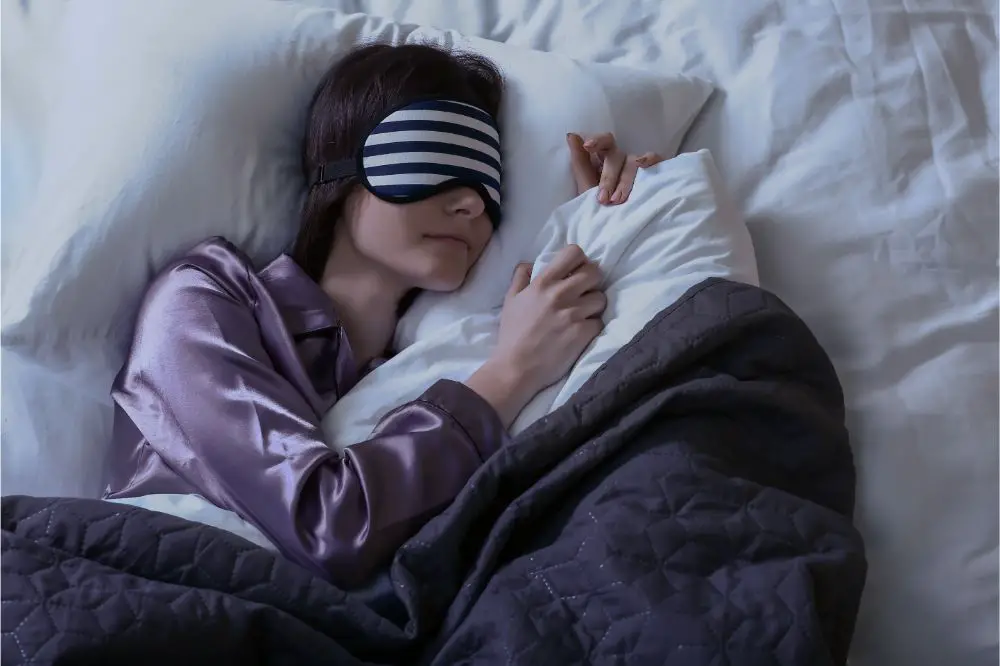
You might wonder if sleeping with a face mask is safe for your health and well-being. Let’s discuss some of the pros and cons of this practice to help you better understand its possible implications.
Pros
- Heightened protection: Wearing a face mask while sleeping can provide an extra layer of protection, especially if you’re dealing with allergies or living in a crowded space. It can filter out allergens, dust, and bacteria, making your sleep environment cleaner and more comfortable.
- Safer breathing: For some people, wearing a mask during sleep can improve breathing patterns, particularly if you suffer from sleep apnea or other breathing disorders. The mask may help keep airways open and reduce disruptions in your sleep cycle.
Cons
- Skin irritation and acne: Prolonged mask use during sleep can lead to moisture and sebum buildup, which can, in turn, lead to acne breakouts or skin irritation. It’s essential to clean your mask regularly and choose a gentle material on your skin.
- Breathing difficulty: Depending on the type and fit of your mask, it may make breathing more challenging, especially if you’re a side sleeper or tend to move around a lot in your sleep. Be sure to select a comfortable mask design with adequate airflow.
To sum up, sleeping with a face mask has pros and cons, largely depending on your unique needs and preferences. It can be an effective way to protect your respiratory system from allergens and other harmful particles. Still, it’s also crucial to consider its potential impact on your skin health and overall comfort. Remember to choose a mask that suits your needs and allows you to breathe quickly and safely throughout the night.
Selecting the Right Mask for Sleep

Choosing the perfect sleep mask is essential for a good night’s rest. Here are some factors to consider when picking out a suitable mask for sleeping.
Comfort: Your sleep mask should be comfortable and soft on your skin. Look for a mask made of hypoallergenic materials to avoid any irritation while you sleep.
Size and design: Sleep masks come in various sizes and designs. Ensure the mask you select covers your eyes and contours your face to block out unwanted light completely. You may find a mask with an adjustable strap helpful to customize the fit according to your head size.
Materials: The fabric your sleep mask is made of will directly impact your comfort, so choosing the right material is crucial. Materials like silk, cotton, and bamboo are popular for their soft, breathable, and hypoallergenic properties.
Here’s a quick rundown of some sleep mask materials and their benefits:
- Silk: Soft, luxurious, and hypoallergenic
- Cotton: Breathable, natural, and gentle on the skin
- Bamboo: Eco-friendly, antimicrobial, and hypoallergenic
Straps: Pay attention to the strap design that secures the mask to your head. Look for adjustable straps that provide a snug fit without putting too much pressure on your head.
One final reminder: don’t forget to listen to your preferences and needs when picking the right mask for sleep. A perfect sleep mask for your friend may not work for you, so focus on what makes you feel relaxed and comfortable for a peaceful slumber.
Proper Care for Your Sleep Masks
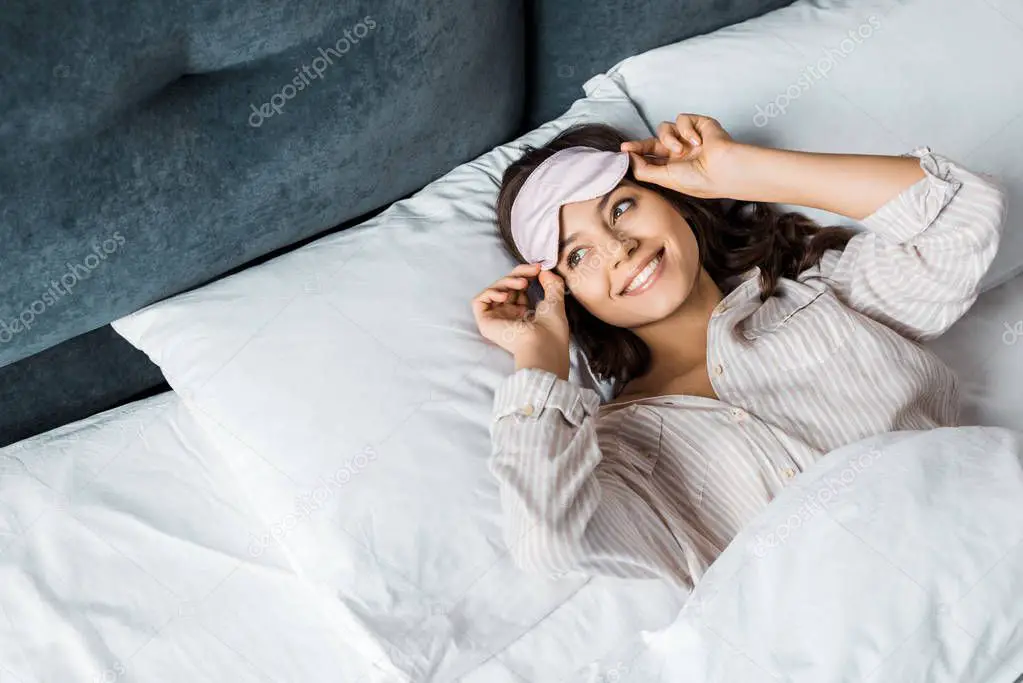
Taking care of your sleep mask ensures its effectiveness and longevity. Here are some tips on maintaining and cleaning your mask so it stays in excellent condition for your nightly use.
Keep it clean: It’s essential to regularly clean your sleep mask to remove dirt and bacteria that might have accumulated. Gently hand wash the mask with mild soap and warm water. Be sure not to use harsh chemicals or abrasive materials, which can damage the fabric. After washing, gently squeeze out excess water and allow it to air dry.
Deal with stains promptly: If your mask becomes dirty or stained, it’s best to clean it as soon as possible. The longer the dirt remains on the fabric, the more difficult it may be to remove. Use a soft cloth or sponge to gently remove the stain without damaging the material.
Don’t soak your mask: While keeping your sleep mask clean is essential, avoid soaking it in water for extended periods. Excessive soaking can weaken the fabric and impact its effectiveness in keeping out light. Gently washing and rinsing your mask is usually sufficient to remove dirt and stains.
Store it properly: When not using your sleep mask, store it in a clean, dry place. This will help protect it from dust and dirt accumulation. You might consider placing it in a small pouch or a drawer with other nighttime essentials.
- Inspect your mask for wear: Over time, sleep masks can begin to show signs of wear and tear. Regularly check your mask for fraying, loose stitching, or damaged parts. Addressing these issues early will help prolong the life of your mask.
By following these simple tips, you can maintain your sleep mask’s effectiveness and enjoy uninterrupted sleep for nights. Remember, a clean and well-cared-for mask is key to better sleep quality.
Sleeping with Masks During the Covid-19 Pandemic
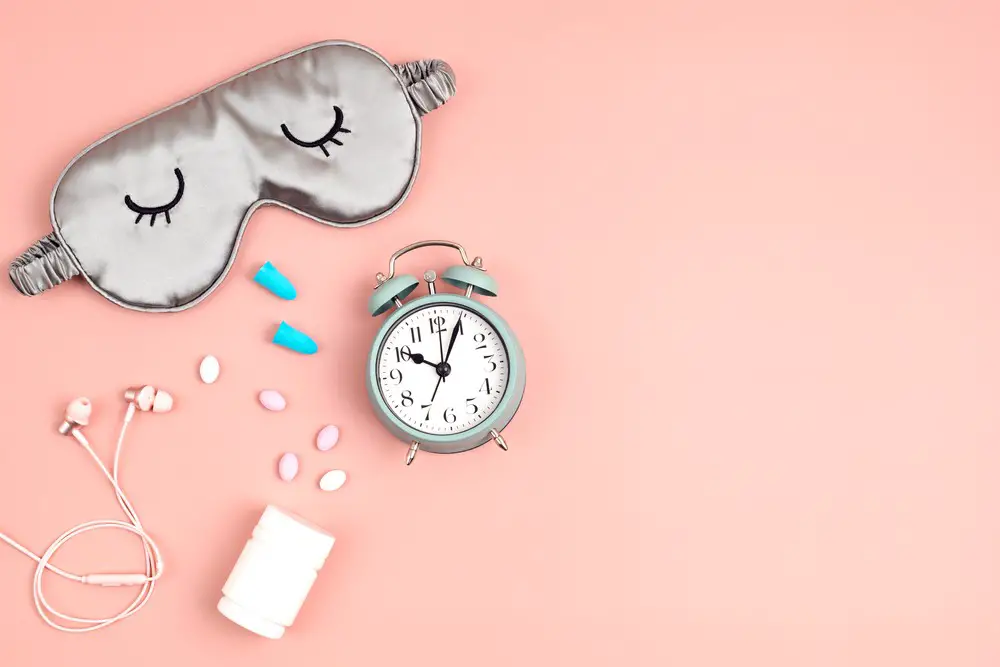
During the Covid-19 pandemic, people have adopted wearing masks to protect themselves and others. You may wonder if sleeping with a mask on is safe and beneficial. Let’s explore this in more detail.
Firstly, consider why you’re thinking about wearing a mask while sleeping. If you’re in a shared space where social distancing is complex, like a hostel or dormitory, wearing a mask could help reduce the risk of transmission. However, the need to wear a mask while sleeping is less urgent if you’re in your bedroom, away from others.
It’s crucial to remember that cloth masks are designed for short-term use and should not be worn for extended periods. When you sleep, your body needs to breathe freely, so ensure the mask you choose does not obstruct your airflow. Opt for a light, breathable material like cotton to protect yourself and maintain comfort.
Tips for Sleeping with a Mask:
- Choose a comfortable mask that isn’t too tight or restrictive
- Ensure the mask doesn’t block your nose or mouth, allowing for proper airflow
- Wash your mask regularly to maintain hygiene
Although wearing a mask at night might be helpful in some situations, it’s not a substitute for proper social distancing and hygiene practices during the pandemic. Instead, focus on maintaining distance from others, washing your hands frequently, and following local guidelines for mask-wearing in public spaces.
In conclusion, sleeping with a mask during the COVID-19 pandemic may offer some protection, but it’s essential to evaluate your situation before deciding. Weigh the potential benefits against practical concerns like comfort and breathing. Remember that practicing good hygiene and social distancing remain the most effective ways to stay safe during this time.
Role of Sleep Masks in Dealing with Stress and Anxiety
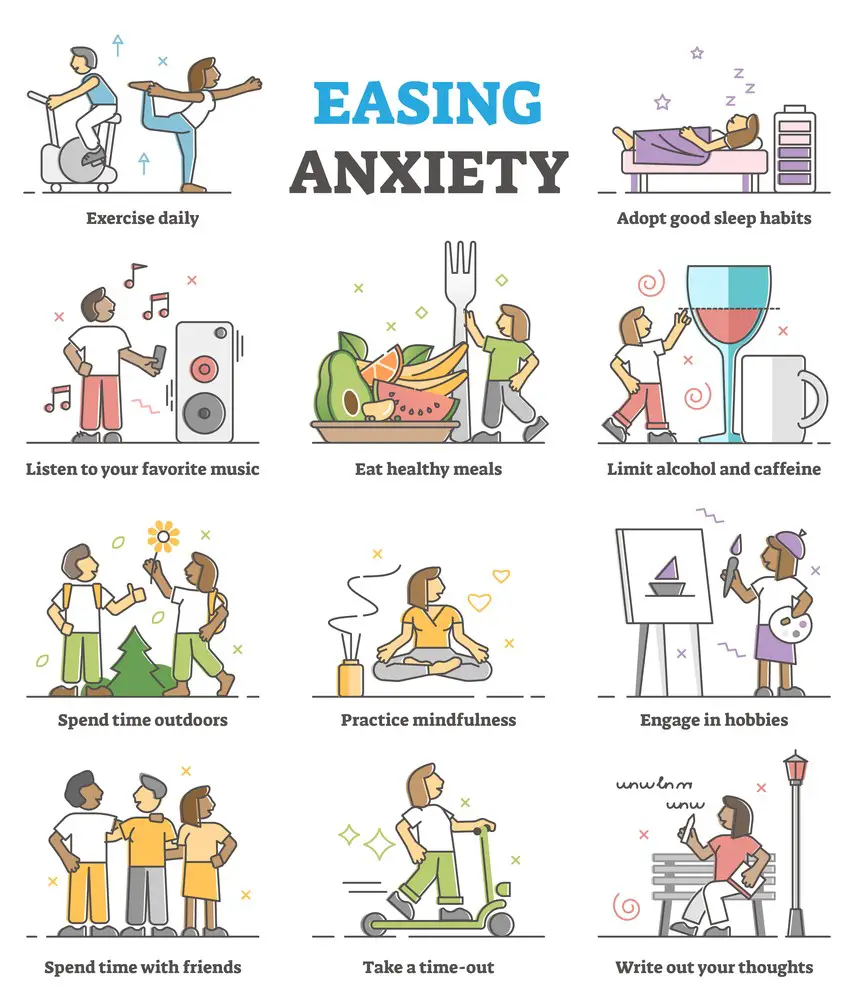
Sleep masks can be a game changer when dealing with anxiety and stress. In today’s fast-paced world, it’s no secret that stress and anxiety can wreak havoc on your mental health. Incorporating a sleep mask into your bedtime routine can improve your overall mood, sharpen your focus, and experience more restful sleep.
A sleep mask works by blocking out external light, which can ease anxieties associated with sleep. A sleep mask could make all the difference for you, particularly if your anxieties pertain to an inability to relax before bed. So, how can you utilize a sleep mask to improve your overall well-being? It’s simple:
- Establish a relaxing bedtime routine: Routines can signal our bodies and minds that it’s time to wind down for sleep. Creating a soothing bedtime ritual that includes your sleep mask can help condition your mind, reducing nightly stress levels.
- Choose the right sleep mask: Pick one that fits comfortably and sits snugly on your face. A mask made from soft fabric, such as silk, will be ideal for ensuring a relaxing experience.
- Combine the mask with deep breathing: As you don your sleep mask, incorporate deep breathing exercises to relax your mind and body further. Slow, steady inhalations and exhalations can help relieve anxiety and prepare your body for rest.
By using a sleep mask consistently, you can create a comforting routine that helps alleviate stress and anxiety at night. Ultimately, getting quality sleep will leave you better equipped to take on daily challenges and foster a healthier mental state.
The Need for Additional Sleep Aids
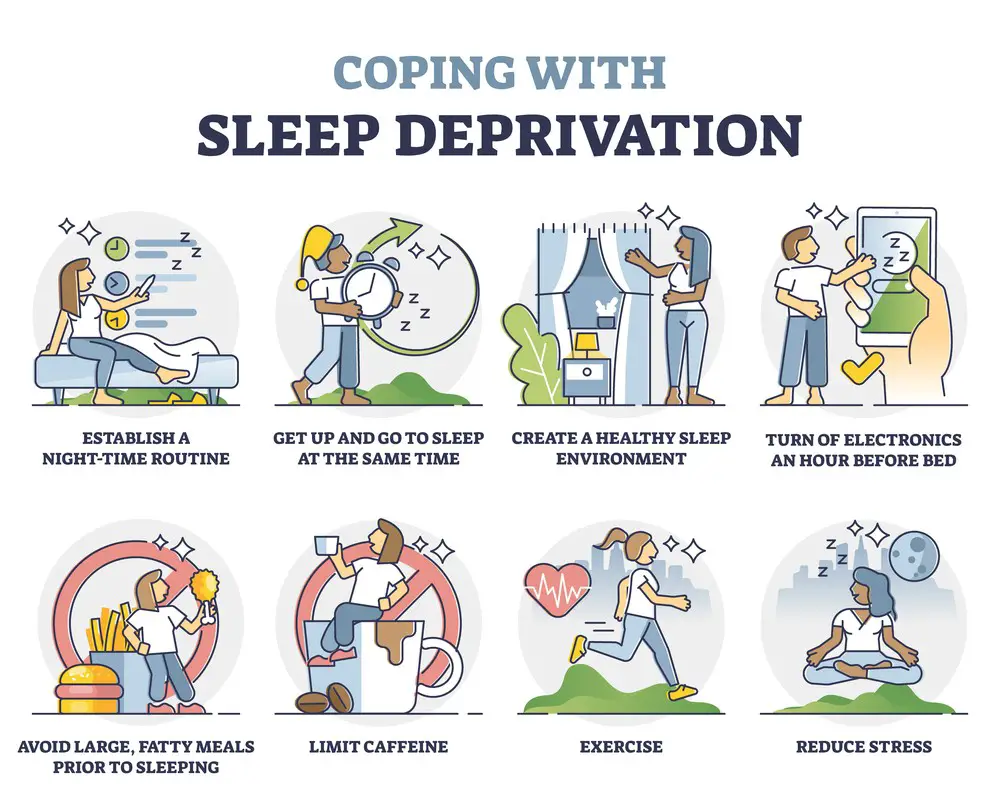
Sometimes, wearing a sleep mask alone might not be enough to ensure a restful night. You may want to consider incorporating additional sleep aids, such as:
- Pillows and blankets: Ensuring you have comfortable and supportive pillows and soft and cozy blankets can significantly improve your sleep quality. Experiment with various types and materials to find your perfect combination.
- Weighted blankets: These blankets apply gentle pressure, mimicking a hug sensation. They can help reduce anxiety, promote relaxation, and improve sleep quality.
- Humidifiers: Maintaining a comfortable humidity level in your bedroom can help prevent dry air, which can cause congestion and affect your overall sleep quality. Try using a humidifier to create a more comfortable environment.
- White noise machines: These devices emit a consistent sound that can mask external noise, such as street traffic or loud neighbors. White noise can help create a soothing environment for sleep.
Remember that it’s important to eliminate everyday sleep disruptors, like:
- TV and artificial light: Exposure to screens and artificial light close to bedtime can interfere with your body’s natural sleep-wake cycle. Dim the lights and avoid screen time at least an hour before bed.
- Shift work and jet lag: Circadian rhythm disruptions due to irregular work hours or travel can make it harder to fall asleep and stay asleep. Manage these disturbances by creating a consistent sleep schedule and using aids when needed.
- Sleeping pills: While they may provide temporary relief, avoid relying on them, as they can have side effects and may be habit-forming. Pursue natural methods and consult your doctor for the best approach.
By combining a comfortable sleep mask with these additional aids, you can create an optimal environment for a restful night’s sleep. Every individual is unique, so finding the perfect combination may require trial and error.
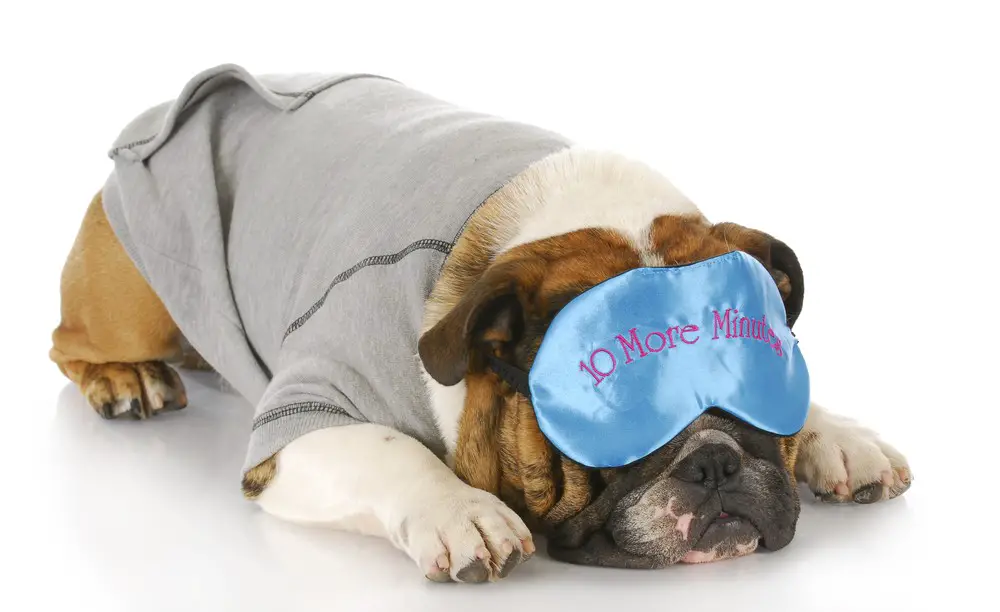
Who Can and Who Won’t Benefit From a Sleeping Mask
Who Can Benefit:
- Light Sleepers: If you’re sensitive to light, a sleep mask can help you achieve deeper sleep by blocking out distractions.
- Frequent Travelers: Airplanes and hotels often have varying levels of light control; a sleep mask can provide consistent darkness.
- Shift Workers: Those with non-traditional working hours might find a sleep mask beneficial for daytime sleeping.
- Meditators and Mindfulness Practitioners: A sleep mask can enhance focus and relaxation during meditation or mindfulness exercises.
Who Won’t Benefit:
- Claustrophobic Individuals: If you’re uncomfortable with something covering your face, a sleep mask might cause anxiety.
- People with Skin Sensitivities: Material or pressure from a sleep mask may irritate sensitive skin.
- Heavy Sleepers: If you can sleep through any condition, a sleep mask might not make much of a difference for you.
Understanding your needs and preferences is crucial in deciding whether a sleep mask would be a valuable addition to your sleep routine.
Frequently Asked Questions

Is it safe to wear a surgical mask while sleeping?
Wearing a surgical mask while sleeping is generally safe for most individuals. However, you might experience some discomfort due to the mask’s fit or stuffiness. Listen to your body and make adjustments to find what works best for you. Consult your healthcare provider for personalized advice if you have any breathing difficulties or underlying health issues.
Key takeaway: Wearing a surgical mask while sleeping is usually safe, but it’s important to prioritize your comfort.
Can sleeping with an N95 mask provide protection?
Sleeping with an N95 mask may protect against airborne particles, such as allergens or pathogens. But remember, these masks are designed for short-term use. Extended wear could lead to discomfort or breathing difficulties. For optimal protection, it’s best to use a clean N95 mask and change it as needed, according to guidelines.
Key takeaway: While an N95 mask can offer some protection, be cautious of potential discomfort during extended use.
Should you sleep with a face mask during COVID-19?
During the COVID-19 pandemic, sleeping with a face mask is generally unnecessary if you’re in your home and following safety guidelines. However, in scenarios where social distancing is difficult (like shared living spaces), wearing a mask overnight might be a good precaution. If unsure, seek guidance from local health authorities or your healthcare provider.
Key takeaway: Sleeping with a face mask during COVID-19 depends on your circumstances and location.
Is it necessary to wear a mask while sleeping in a hospital?
In a hospital setting, wearing a mask while sleeping may be recommended or required, depending on the institution’s policies and your medical condition. Check with the hospital staff for specific guidelines and follow their advice for the best protection.
Key takeaway: Always adhere to hospital guidelines regarding mask-wearing during your stay.
Can wearing a mask overnight help with allergies?
Wearing a mask overnight could help reduce exposure to allergens such as dust mites, pet dander, or pollen, potentially alleviating some allergy symptoms. However, effectiveness will vary depending on the mask type and your specific allergies. Reach out to your healthcare provider for personalized recommendations.
Key takeaway: While not a cure-all, a mask might offer some relief for allergy sufferers during sleep.
How long is it recommended to keep a face mask on?
The recommended duration of face mask use depends on the mask type and purpose. Generally, surgical masks or N95 respirators should be discarded after a single use or if they become soiled, damaged, or difficult to breathe. Cloth masks should be washed and dried regularly. Always follow the manufacturer’s guidelines and any additional healthcare recommendations.
Key takeaway: Pay attention to mask care instructions and consult healthcare professionals for personalized advice.
- 3 Ways Wearing a Hat Can Help Lower Your Stress Levels - April 19, 2025
- Breaking the Silence: Why Men’s Mental Health Matters More Than Ever - April 15, 2025
- How to Transform a Home’s Patio Space into a Relaxing Space - March 23, 2025
This site contains affiliate links to products. We will receive a commission for purchases made through these links.

